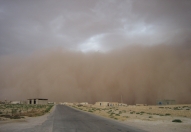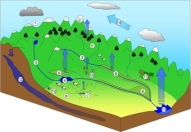Prof. Jason P. Evans
Climate Change Research Centre
University of New South Wales









Development and evaluation of a global long-term passive microwave vegetation product.
Liu, Y.Y, A.I.J.M. Van Dijk, R.A.M. de Jeu, M.F. McCabe, and J.P. Evans
EGU General Assembly, 22-27 April, Vienna, Austria. Abstract
Vegetation optical depth (VOD) retrievals from three satellite-based passive microwave instruments were merged
to produce the first long-term global microwave-based vegetation product, spanning from 1988 through 2008. The
resulting VOD product shows seasonal cycles and inter-annual variations that generally correspond with those
observed in the Advanced Very High Resolution Radiometer (AVHRR) Normalized Difference Vegetation Index
(NDVI). Some notable differences exist in the long-term trends: the NDVI, operating in the optical regime, is
sensitive to chlorophyll abundance and photosynthetically active biomass of the leaves, whereas the microwave-
based VOD is an indicator of the vegetation water content in total above-ground biomass, i.e. including wood
and leaf components. A global analysis is undertaken to evaluate global VOD trends over 1988-2008. We conduct
Mann-Kendall linear trend tests on annual average VOD to identify regions of significant change. Patterns for
these regions were evaluated against independent datasets to diagnose the underlying cause of the observed trends.
Results indicate that: (1) VOD patterns correspond strongly to temporal precipitation patterns over water limited
regions; (2) over croplands, annual average VOD shows a similar temporal pattern with reported crop production;
(3) over forest, the spatial pattern of VOD decline agrees well with patterns of deforestation, fires and clear cutting.
We conclude that VOD can be used to estimate and interpret global changes in total above ground vegetation.
We expect that this new observation source will be of considerable interest to hydrological, agricultural, climate
change and carbon cycle studies, and provide new insights into these and related process investigations.
|
|